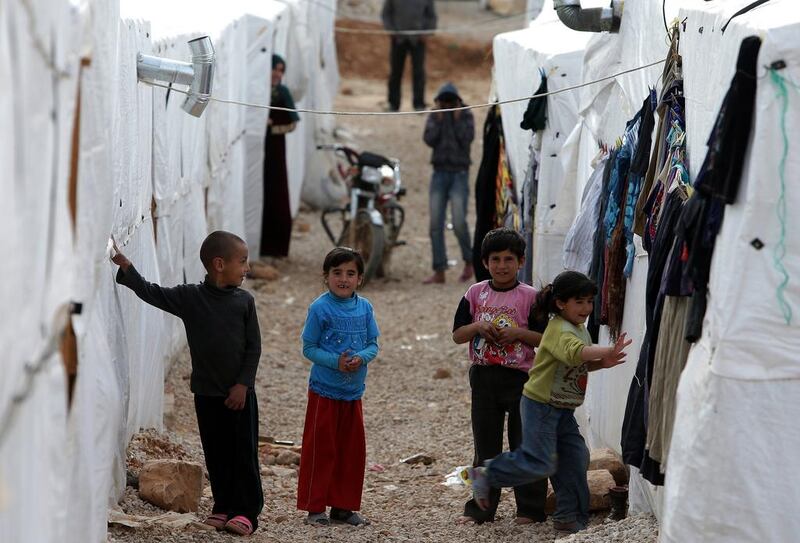DUBAI // The Syrian refugee crisis in Lebanon is equivalent to an influx of 2.5 million people to the UAE in 18 months, a United Nations relief agency chief warned yesterday.
"There are over a million refugees and this is increasing at the rate of 50,000 a month," said Ross Mountain, the UN resident humanitarian coordinator in Lebanon. "Right now that is 25 per cent of Lebanon's population."
Mr Mountain met Sheikha Lubna Al Qasimi, the Minister of Development and International Cooperation, to discuss the issue.
"Lebanon cannot manage on its own. It badly needs regional and international support," he said.
Mr Mountain said the UAE had been generous in its efforts to help the Syrian people, but more was needed.
“The UAE has been very supportive and chosen to channel resources through the UN system, but that allocation is for Syrians inside Syria and in Jordan,” Mr Mountain said.
“We hope the UAE might consider the needs of Lebanon, given the strong ties between the UAE and Lebanon and the large Lebanese community here.”
Mr Mountain, who has returned to Beirut after a four-day visit to the UAE, said the cost to Lebanon of the Syrian conflict would be US$7.5 billion, nearly Dh30bn, by the end of the year.
“One of the dire aspects is that refugees are coming to the poorest areas of Lebanon. It has been remarkable the extent to which Lebanese have accommodated these people coming in. The question is how long this accommodation can last.”
The UN was working on a road map to assist the Lebanese and refugees, Mr Mountain said.
“We are working with municipalities on the front line of this influx to help supply water and are building capacities.
“The challenge is that there is no end in sight for the Syrian crisis at the moment and it is a major worry for the new government in Lebanon.”
Unlike Jordan, which has camps for refugees, Lebanon has none.
There are six camps in Jordan, including the massive Zaatari camp, which is home to more than 100,000 refugees.
The Azraq refugee camp, Jordan’s sixth, opened recently and can accommodate more than 75,000 people.
“There is no major camp in Lebanon,” Mr Mountain said. “About 230 Lebanese communities are severely hit by the influx of refugees and the majority of these Lebanese are extremely poor.”
He hoped to come back soon to the UAE to discuss the plight of Syrians.
“I am aware there has been quite a lot of support bilaterally. I will be back and I’m hoping there will be increased interest in contributing to Lebanon.”
Mr Mountain also urged residents to do their bit.
“There are number of programmes, links with affected communities,” he said. “I hope others would join in and provide support to host communities in Lebanon facing the brunt, particularly in districts like Akaar and Bekka.
“Given the size of the influx, it is unfair for the international community to expect Lebanon to manage alone.”
pkannan@thenational.ae






